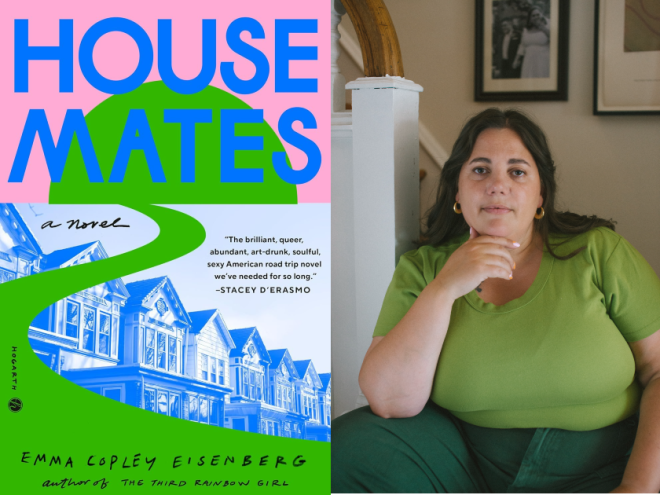Emma Copley Eisenberg’s debut novel, Housemates, follows the journey of Bernie Abbott (loosely inspired by twentieth-century photographer Berenice Abbott) and Leah McCausland (similarly inspired by Abbott’s lover, the writer and activist Elizabeth McCausland) as they road-trip through rural Pennsylvania for three weeks, photographing whatever draws their attention. Both are young, queer artists. Both are lost, unsure what to make of the world.
It’s possible to read Copley Eisenberg’s novel as just that — a novel. This, however, would be to undersell the depth of her inquiries about America during our current moment. How will Bernie process the fact that her mentor, a haunted older man with a keen eye and photographic prowess, harmed other students? How will she and Leah learn to hold both the beauty and pain of the places they come from? How will we?
Copley Eisenberg doesn’t rely on Bernie and Leah to tell their own story. Instead, she has entrusted an omniscient narrator, the fictional photographer Ann Baxter, who comes from an older generation of queer artists. Ann’s character allows for a cross-generational richness that would have otherwise been absent from the book.
The author is also interested in the problem of being a person in a body. “How strange it was to be inside a body, a floating and complex person with many different ways of feeling,” Bernie reflects early in the novel. Everyone in Housemates—from the bartender (“with her big, pretty jaw” and a “wide, hollow space between her breasts”) to the Amish boy hitchhiker (with his black hat and suspenders “his hip popped out at a jaunty angle”) — is described with loving care. Everyone matters in this book, and everyone is painfully, exquisitely human.
The overarching question of Housemates is how to live in the world. How to live with oneself, and how to live with others. There is radical compassion here. The book seems to be positing a simple truth: that this world is our house. Everyone here is our housemate. Will we figure out how to see each other, care for each other? Or are we going to burn the place down?
Mikhal Weiner is an Israeli-American writer, journalist, and part-time Cantor living in New Jersey with her wife and two kids. She graduated Summa cum Laude from Berklee College of Music in 2014. She has written music and book reviews, profiles of artists, reported work, and personal essays for publications like Parents, NY Jewish Week, Real Simple, Pride Source, and more. Her Substack, Welcome to the Chaos Palace, is about exploring the idea that coloring outside the lines can unlock new realms of creativity and innovation. It’s also about being a mom with ADHD and Judaism and queerness. Her work, whether text or music, is deeply influenced by her experiences growing up as an Israeli gay woman in the early aughts and her love of words and music. She loves writing about people, places and the ways their stories intersect.




